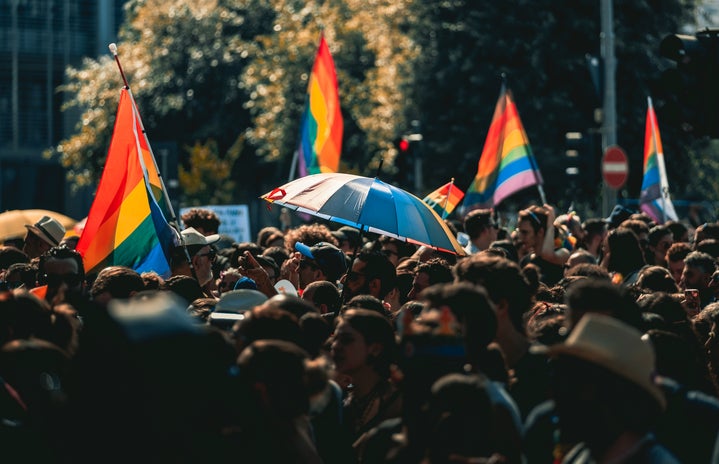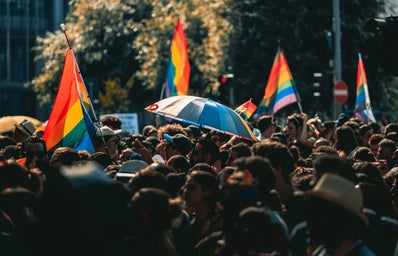The LGBTQ+ community experiences many privileges today, including being able to be out openly in many areas, having a presence in both TV and movies, being able to be married, etc. While the community has these privileges now, it’s important to point out that they still face many immense struggles–conversion therapy is still a thing, many people are assaulted for being gay, people can be evicted or fired for being gay, etc. It’s important that we look back at the journey that brought us to where we are today. These are ten iconic moments in LGTBQ+ history.
- 1924: The first gay rights group is established
-
World War I veteran Henry Gerber founded the Society for Human Rights in Chicago. This was the first gay rights group in America, and its newsletter, “Friendship and Freedom,” was the United States’ first recorded gays rights publication.
- January, 1958: The Supreme Court rules in favor of gay rights
-
After the US Post Office refused to deliver America’s first widely distributed pro-gay publication, ONE: The Homosexual Magazine, the case went to the US Supreme Court–and the court ruled in favor of gay rights for the first time, making it a landmark case in LGBTQ+ history.
- June 28, 1969: The Stonewall riots spark the beginning of the LGBT movement
-
Early in the morning on June 28, 1969, police performed a raid at the Stonewall Inn, a New York City gay bar–but the customers and their supporters took a stand. The event turned into a violent protest and led to a days-long series of riots. Those “Stonewall riots” are largely considered the start of the LGBTQ+ civil rights movement in the US. 2019 marked the 50th anniversary of the LGBTQ+ civil rights movement. Since its start, the Stonewall Inn has become a national monument, and a monument was built in NYC for Marsha P. Johnson–the transgender woman of color who threw the first stone in the riots.
- 1973: Homosexuality is no longer declared a mental illness
-
After years of studies, analysis, and changing cultural attitudes, the American Psychiatric Association’s board of directors removed homosexuality from the official list of mental illnesses, known as the Diagnostic and Statistical Manual of Mental Disorders (DSM), a move that was upheld with a vote by the association’s membership.
- October, 2009: The Matthew Shepard & James Byrd Jr. Hate Crimes Prevention Act becomes a law
-
Former President Barack Obama signed the Matthew Shepard and James Byrd, Jr. Hate Crimes Prevention Act into law. The act was named for two men who were murdered in hate crimes–Matthew Shepard because he was gay, and James Byrd, Jr. because he was black. The new law expanded previous hate crime legislation to officially categorize crimes motivated by actual or perceived gender, sexual orientation, gender identity, or disability as hate crimes. Matthew Shepard’s case is well known as one of the most notorious hate crimes against an LGBTQ+ youth. His body wasn’t laid to rest until 2018–20 years after he was brutally murdered.
- September, 2011: “Don’t Ask, Don’t Tell” ends
-
Former President Obama officially revoked the anti-gay, discriminatory “Don’t Ask, Don’t Tell” law, which prevented openly gay Americans from serving in the US armed forces.
- April, 2015: Obama calls for end to conversion therapy
-
After the tragic suicide of transgender teenager Leelah Alcorn, who was subjected to Christian conversion therapy, former President Obama publicly called for an end to the dangerous practice meant to change people’s sexual orientation or gender identities.
- June, 2015: Sexual orientation is added to the military’s anti-discrimination policy
-
Even though “Don’t Ask, Don’t Tell” was repealed in 2011, sexual orientation was still not a protected class–unlike race, religion, sex, age, and national origin–under the Military Equal Opportunity Policy until June of 2015, when the US Defense Secretary Ashton Carter announced that it would officially be added to the anti-discrimination policy.
- June 26, 2015: Love wins
-
The Supreme Court finally and officially declared same-sex marriage a Constitutional right nationwide, meaning all states must allow Americans to get married regardless of their gender or sexual orientation.
- November, 2018: LGBTQ candidates sweep the midterms
-
More than 150 LGBTQ+ candidates were elected into office in the 2018 midterm elections, putting a historic number of gay and transgender politicians in positions of power. These wins happened “from the US Congress to governors’ mansions to state legislatures and city councils” Annise Parker, president and CEO of the Victory Institute and Victory Fund, told NBC News.
While many LGBTQ+ youth take their privileges for granted, it’s important to remember how we got to where we are. It’s not the end of the LGBTQ+ journey, just the beginning, and I can’t wait to see where the community goes.
Want to keep up with HCBU? Make sure to like us on Facebook, follow us on Instagram, check out our Pinterest board, and read our latest Tweets!



